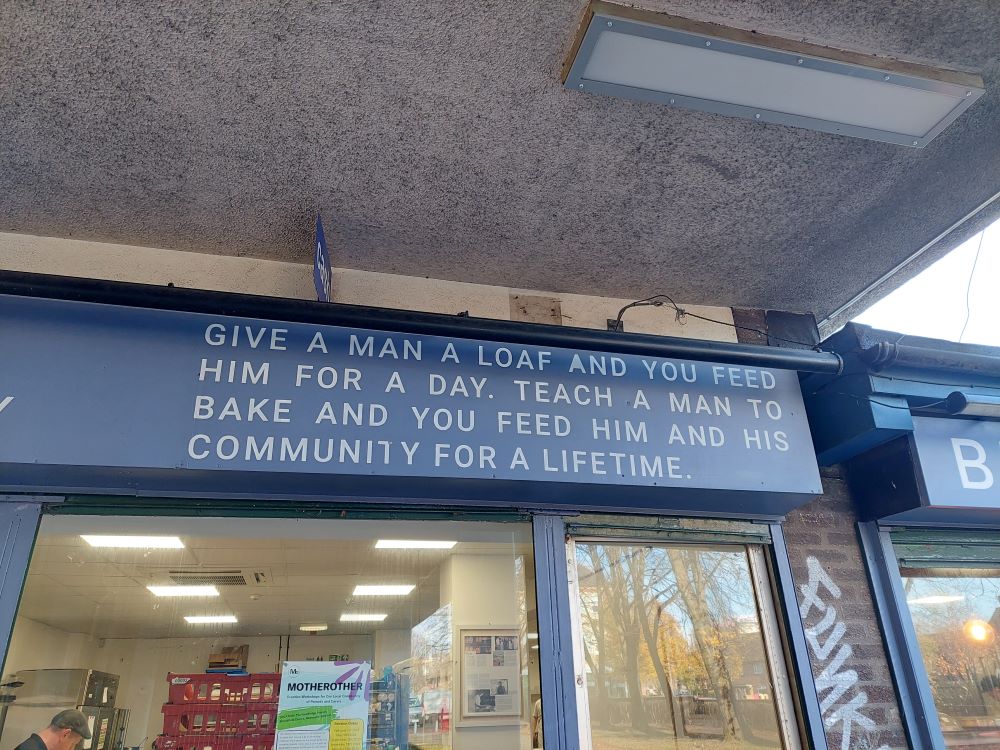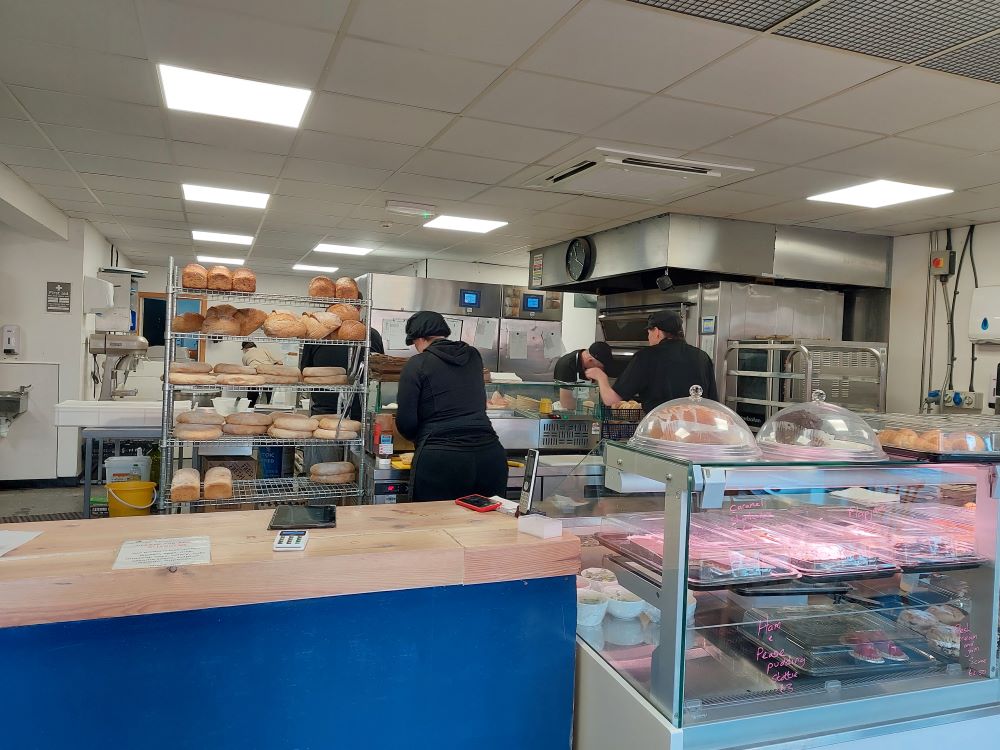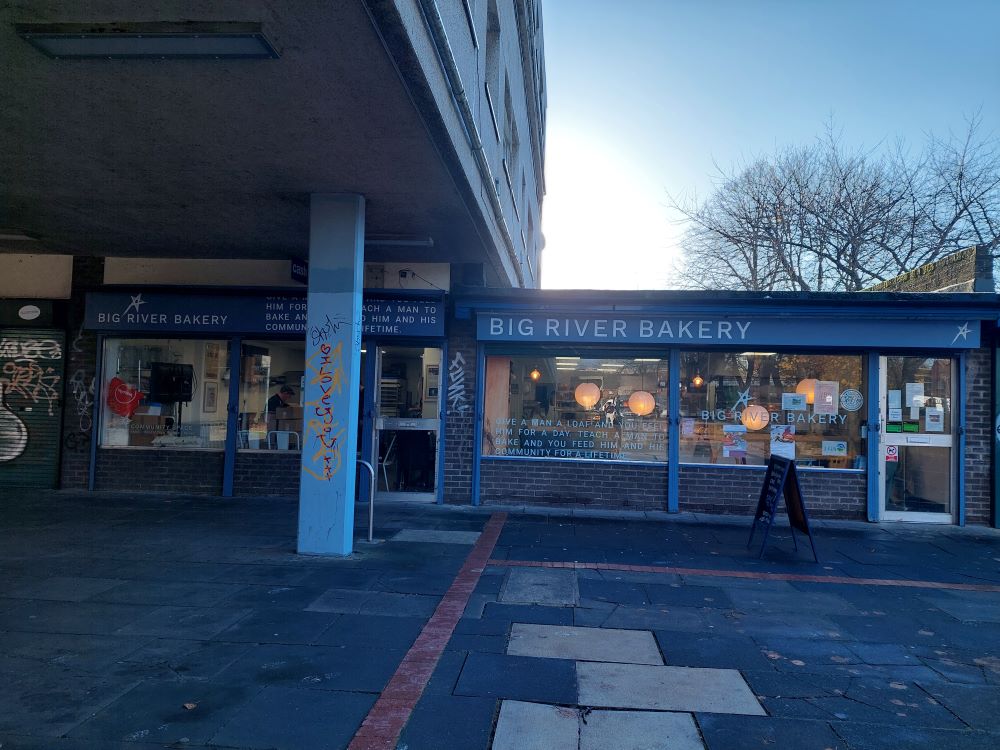An Interview With Gail:
28th February 2023
Emily: How and Why did Big River Bakery Start?
Gail: My husband, Andy Haddon, always wanted to do something with communities. He’d worked in big business, as a consultant […]. He’d done all sorts of jobs. When he came back to the Northeast, he wanted […] to make a difference. He tried various things and sort of fell into baking.
“Baking is quite magical; it brings lots of different people together in different ways. Not only is it a staple of a lot of cultural food, [but also] the baking and sharing of bread brings people together.“
So, I think that seed started to form. It was a very long process. It took years and years to become the bakery now. It [meant] working with communities, teaching communities to bake in their own spaces, working with schools, working with care homes, things like that. And I think the idea slowly evolved to what this could be and what this could mean.
Emily: What would you say the objectives of the bakery are?
Gail: I think Andy’s dream was to make the Northeast a place where good and nutritious food is equitable and available for everybody. I think it has become much more than that. […] What we do is work with lots of different people in our community. It’s about making communities strong. It’s moving all those things together to create a strong community. It’s very difficult to just exist on handouts so we have a commercial part of the business [to support what we do] which are the shop, café, wholesale and training courses that are paid for.
The other side is the social aspect. It’s quite a magical thing, but it comes from talking to people. I’ve sat in here (The Café) and teachers have overheard me talking to someone…and they’ve talked to me about the issues they have at schools about some children not being able to access breakfast clubs. So, we thought about how we could support that, and we then started providing breakfast bags for local schools.
“A lot of our work comes from being embedded [in the community] and understanding it, not pushing anything onto them, but finding out where the gaps are, how we can support them, what are the real needs of our community.”
[…] It’s that weaving, talking to people, because you never know where a conversation is going to go. We know that there’s people who can’t afford to come to the shop and buy things so we have little cards, people can take a card and get a free hot meal- no questions asked. We know from experience that people don’t like charity, so by doing things that are available to everybody is a big part of what we do as well. It’s quite complex but also simple at the same time.
I always say we do things with kindness, there’s such a strength in being kind, and sometimes it’s difficult to be kind. For instance, last week we had the schools in baking which is a great thing, but they’re quite disruptive. It would be easy to say we won’t bother because it’s too hard, but we didn’t. […] We ensure that we have the right values, we say what we’re going to do and we follow through.


Cameron: You’ve already touched on how you operate on two sides, the business and the social and community work. Are there any challenges being involved in two different spheres and are there any blessings as well?
Gail: The challenges are balancing it, juggling it. Especially, in today’s economic climate where ingredients, cost of living, national insurance and electricity are all up. Part of what we do is try and keep our products affordable which is hard when everything is going up. We don’t use cheap ingredients, we want to keep the quality but keep the prices down. So that’s quite a challenge.
I think having the business helps us to realise the potential of what we want to do in the community. We can bake things, we can have different prices for different people, we can do whatever we want really and, because we make things here and we know how much everything costs, we can do special deals with charities and people. For example, the free food, we know how much we can afford to give away. I think people like what we do, the social side of what we do. Our customers and friends are very kind and support the work we do. We do get donations that support our cause.
Everything we do here, like the free courses, makes the place feel alive. People come in here and say it feels welcoming to all. We’re limited on space so we can’t do as much as we want to do here.
“It’s that constant juggle between paying the bills and doing as much as we can in the community.“
Emily: You touched on collaboration. I was reading the online brochure, and you talked about the business, the charities and the universities all coming together to create cross-sector work to help support local issues. Can you touch on that?
Gail: I can give you an example. The Northeast has the highest rate of obesity and reduced life expectancy due to poor diet in the UK. One of the projects Andy has started with the university is looking at how we can make food healthier. We’re looking at the ‘humble stottie’. What we’re doing is looking at whether we can have a beetroot stottie since beetroot is highly nutritious and good for you. But what we need to do is make it and test it with the help of the university to see whether it really is a healthier bread for people. […] Doing research, it’s also helping people.
We also work with three young people with learning difficulties, […] we work with organisations that support people who have been to prison, meaning people who have barriers to employment. Last year we had lots of ‘employment sessions’, teaching people how to bake, but it was more about confidence and bringing people together, talking about them as individuals and what they needed for their path forward. Some people are far removed from the job market, so it’s [important to know] what we can do with third parties to overcome this.
It’s that weaving and understanding, having that network, and knowing who you can call on to help. Last year, we worked with the schools and next year we’re going to be helping with the curriculum. At the moment they are learning about the Romans so we’re going to be making Roman bread, Spelt bread. […] We don’t just want to help kids in the education system but also…children that are schooled at home.
I also wrote a book ‘Scottie the Stottie’. Sales from that go towards funding some of our children’s work. That’s being creative. We’re in the process of making some merchandise and writing another book ‘Super Stottie’ and those profits will also go towards supporting this work. We also have this network of ‘exiled Geordies’, so we do postal Stotties. They go from the top of Scotland all the way to Cornwall. We also have a waiting list of people wanting stotties. All of that supports what we do in the community. […] There’s a lot of things woven in together and juggling all of that can be difficult.
Cameron: What does the word ‘Solidarity’ mean to you, and what does it mean to Big River?
Gail: To me, solidarity is always used as a sort of ‘political’ word, and it can put you off. Solidarity is that weaving, [like a] strong Celtic knot. It is strength in numbers. You can’t make a community without that. We can’t work alone.
“We couldn’t have this place if it wasn’t for the support we’ve had.“
It’s like our surplus, we never throw anything away here. We give it to schools because they have a lot of refugee and asylum seekers, families who haven’t got a lot or who are struggling at the moment. We also do ‘pop up pantries’ at SAW [Shieldfield Art Works], on a Wednesday we give food there. There’s a homeless charity St Vincent Pauls, just down the street, where we can give food. We don’t sell anything that’s not fresh here but we don’t throw it away. [Solidarity is about] thinking what we can do with our surplus. Knowing who to give it to can be quite challenging. You can only do that by being in your community, knowing the right organisations.
Emily: If you could give an organisation like Big River advice what would that be? And, if you could go 5 years into the past and give yourself some advice what would that be?
Gail: I think it’s hard. None of this is easy. You have to be passionate and really want to make a difference. It doesn’t come straight away. I think it comes when you’re older. I think you have a lot to learn when you are younger. I think I was quite selfish when I was young, I thought about myself and what I wanted to do. But as I’ve had more life experience, it gave me time to reflect. I guess I’ve learned a lot through the struggles I’ve had. If you don’t go through those yourself, you don’t actually learn. It’s a hard journey. […] Don’t think everything is going to be linear, you’ve got to think of that weaving especially when working with other organisations.
Knowing what your strengths are and using them. We often use creativity here, but other people have other strengths. It sounds hard but you’ve got to figure it out yourself. It’s like life. If your mum tells you to do something you probably won’t do it, but if you find out yourself, you’ll probably understand it.
“We only learn by doing. Don’t be afraid to fail. We have failed on loads of different things. Failure – we shouldn’t even say that word – is learning. So don’t be frightened to learn and take risks.”
We took a massive risk with this place, but it’s worked. […] Me and Andy have had several different businesses, and you learn a lot about failure. When you bring that together in the end, you create something successful. It’s not all about money.
Cameron: Are there any real notable personal triumphs since Big River started?
Gail: Just getting this place up and running, I think. Though COVID-19 was difficult as well. We’ve been very lucky, Andy is a great networker. We were in The Guardian before Christmas. They came to us because we were part of a locality group. National press is a fantastic thing that we could never afford but we were very lucky to get on.
I think it’s little things to be honest. We did a little thing for Tyne Tees news. When we started the breakfast bags for the schools, a teacher said, “Gail we have all the kids in Assembly, they want to sing to say thank you.” I was in floods of tears. It’s little things like that.
You never know that the tiny decisions you make can have massive effects on people’s lives. I think about that with everyone who comes in here, they might want a five-minute chat but sometimes, if you sit down and talk to someone you can have a massive difference.
“We just need to keep going along as much as we can.“
Emily: What are your hopes and dreams for Big River in the future?
Gail: We’re looking to expand. A lot of work we’ve been doing is working with people who have barriers to employment. However, we’re currently full in terms of employment here. So, being able to move to a bigger premises where we could be able to take on more staff from these backgrounds. It would be similar to the old REMPLOY model – a government-based scheme which supported people with mental and physical obstacles to employment. Even though big firms claim they want to employ people from marginalised backgrounds, it doesn’t really happen. We want to make it happen. That’s our plan. But behind the expansion is the idea of helping people with these barriers. There is a real need for it, and we’ve tried to support them as far as we can, but we cannot employ everybody here. There’ll be challenges with that, but we want to give it a go whilst keeping the work going on here.

